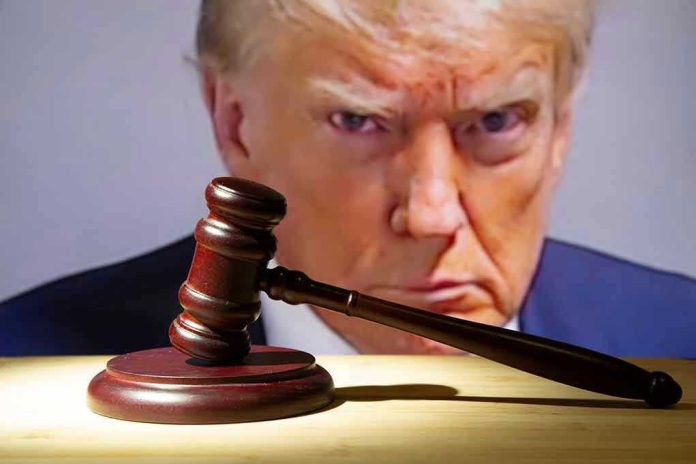
When a Georgia court dismissed the high-profile election interference case against President Trump and 18 co-defendants, it left many questioning the limits of state-level prosecutions against sitting presidents.
Story Overview
- Georgia’s election interference case against Trump and his allies has been dismissed.
- A newly appointed special prosecutor determined the case was too expansive for state prosecution.
- The decision reflects constitutional constraints on prosecuting sitting presidents.
- The dismissal marks the end of all state-level criminal prosecutions against Trump.
Georgia’s Legal Maze
Georgia’s election interference case against President Trump originated from a notorious phone call in January 2021. Trump allegedly pressured Georgia Secretary of State Brad Raffensperger to overturn the 2020 election results. The state pursued charges under its racketeering statutes, resulting in a 19-count indictment in August 2023. However, the case encountered legal hurdles, notably the disqualification of the original prosecutor, Fani Willis. A new special prosecutor reassessed and ultimately dismissed the charges, citing constitutional and practical constraints.
Trump’s call sparked extensive investigations, leading to charges not only against him but also against 18 others, including high-profile figures such as Mark Meadows and Rudy Giuliani. Despite the seriousness of the allegations, the case faced insurmountable challenges. The newly appointed special prosecutor concluded that the charges were not viable at the state level and suggested federal authorities were better equipped to handle such expansive legal matters. The decision to dismiss reflects a strategic shift in prosecutorial focus and acknowledges the complexities of charging a sitting president.
Constitutional Constraints
The dismissal highlights key constitutional principles. The legal framework in the United States imposes significant constraints on prosecuting sitting presidents. This case reaffirms that principle, as the state-level prosecution found itself entangled in constitutional and procedural challenges. The prosecutor’s decision to drop the charges underscores the recognition that state-level efforts to prosecute a president face daunting legal and practical hurdles. The federal government’s prior decision to abandon its own case against Trump further influenced this outcome.
Prosecutors determined that the expansive nature of the case, combined with the complexities of proving a racketeering conspiracy, rendered the charges untenable. Legal experts agree that the case had little chance of success, citing insufficient evidence and the constitutional protections afforded to a sitting president. The dismissal sets a precedent, suggesting that state-level prosecutions against sitting presidents may not be feasible, regardless of the allegations’ gravity.
Implications and Reactions
The dismissal of Georgia’s case against Trump and his co-defendants has profound implications. In the short term, it eliminates significant legal exposure for Trump and his allies. The decision also raises questions about accountability measures for post-election conduct by sitting presidents. It leaves unresolved issues regarding the efficacy of state-level prosecutions in similar circumstances. The case’s conclusion may influence how future administrations navigate legal challenges and underscores the importance of federal jurisdiction in prosecuting high-stakes political cases.
Reactions to the dismissal have been mixed. Supporters of Trump view it as a vindication, while critics express concerns about the implications for election integrity and accountability. Legal analysts emphasize the case’s significance as a precedent-setting moment in American jurisprudence. As the dust settles, the dismissal of this historic case continues to reverberate across the legal and political landscape, prompting discussions about the limits of legal accountability for political leaders.
Sources:
Judge Dismisses Georgia Election Interference Case Against Trump









